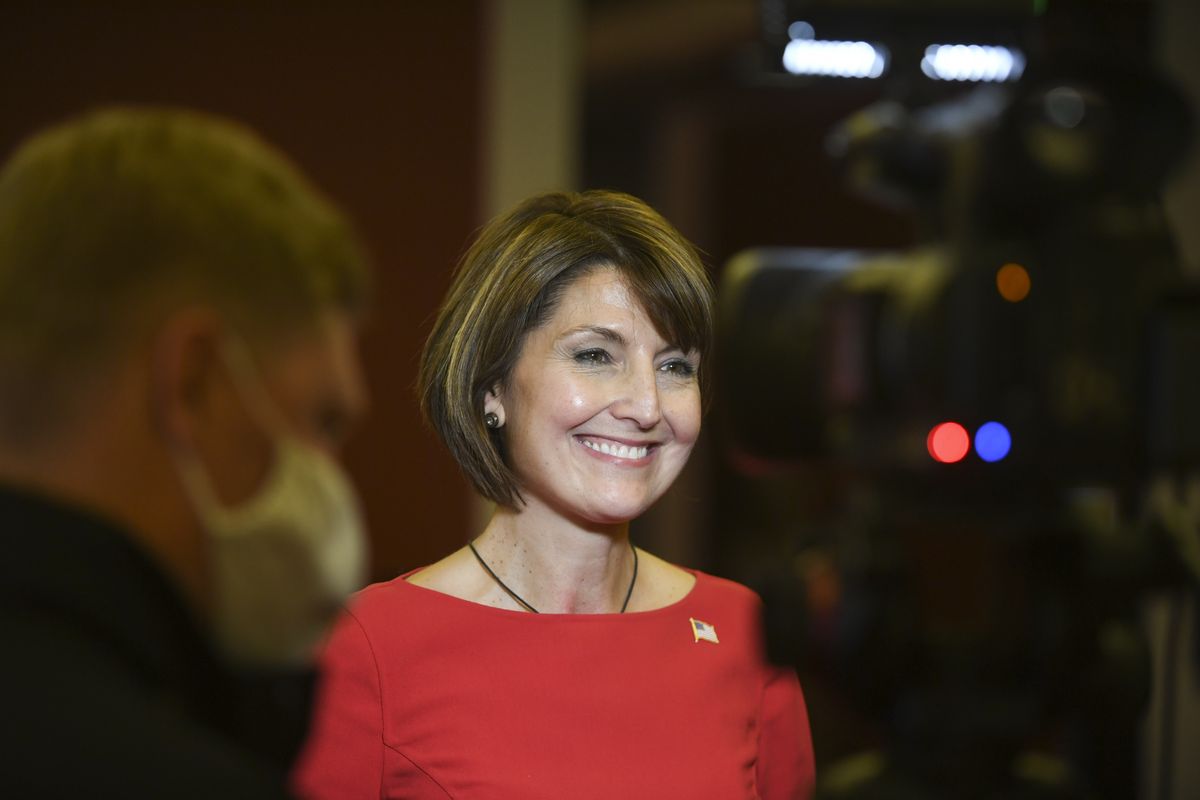We the People: Cathy McMorris Rodgers finally has her dream job in Congress, leading Energy and Commerce Committee
McMorris Rodgers (Dan Pelle/The Spokesman-Review)Buy a print of this photo
Each week, The Spokesman-Review examines one question from the Naturalization Test immigrants must pass to become United States citizens.
Today’s question: Name your U.S. representative.
WASHINGTON – One of the first pieces of advice Rep. Cathy McMorris Rodgers remembers receiving when she was elected to Congress in 2004 came from the late former Sen. Slade Gorton, a fellow Washington Republican: Get a seat on the House Energy and Commerce Committee.
“He said that it’s by far the best committee in the House for the Pacific Northwest, for Eastern Washington,” Spokane’s congresswoman said in an interview with The Spokesman-Review in her Capitol Hill office. “The issues that are going to make a difference in people’s lives, improve our quality of life, usher in new innovation and entrepreneurship, technology that has so defined the Pacific Northwest.”
Now, after she won her tenth two-year term in the House of Representatives and the GOP gained control of the chamber in November’s midterm elections, McMorris Rodgers is on track to chair the influential panel, whose vast jurisdiction includes health care, the internet, energy production, interstate commerce and more.
Despite the nearly two-decade wait, McMorris Rodgers said she thought it would take longer to become chair than it ultimately did. She didn’t get a seat on the sought-after committee until she joined the ranks of GOP leadership in 2009. After ascending to her party’s No. 3 position in 2013, she changed tack six years later, stepping down from her leadership role with her eye on the Energy and Commerce gavel.
After two years of Democratic control in the House, Senate and White House, the GOP’s narrow majority in the lower chamber means no legislation under the panel’s jurisdiction will reach President Joe Biden’s desk without the approval of McMorris Rodgers. It also presents the Spokane Republican with a choice: either work with Democrats to pass bills the president would sign into law or prioritize partisan investigations and messaging bills aimed at helping Republicans regain power in the 2024 elections.
She said there are opportunities for bipartisan lawmaking in the next two years, pointing to bills she has shepherded through the committee this year with current Chairman Frank Pallone, D-N.J., to address mental health and online privacy.
“The Energy and Commerce Committee has a reputation of being a committee … that plows the hard ground necessary to legislate,” she said. “Representatives from different corners of the country, different experiences and priorities, come together on this committee and have addressed, historically, some of the most pressing issues facing the country.”
McMorris Rodgers and other advocates of the mental health bill, which would expand treatment for opioid addiction along with more funding for a range of mental health services, are pushing to get the legislation included in a year-end spending bill. The privacy bill, despite advancing from the Energy and Commerce Committee with near-unanimous support, has stalled amid opposition from a handful of influential California lawmakers and Sen. Maria Cantwell, a Washington Democrat who chairs the Senate Commerce Committee.
As committee chair, McMorris Rodgers said, she intends to push for bipartisan legislation to ensure “a clean energy future,” including measures to streamline the licensing process for hydropower projects and promote the adoption of advanced nuclear reactors.
“There’s growing recognition that America needs to lead on the next generation of nuclear technology,” she said. “We have exciting technology that allows for the recycling of the spent fuel, and Washington state is leading, Eastern Washington is leading this technology.”
McMorris Rodgers and Pallone have also worked together for years on efforts to improve transparency about the prices hospitals charge patients, and the Republican said she believes they can advance bipartisan legislation to that end in the next session of Congress.
Another bipartisan priority that can help Eastern Washington, she said, is closing the “digital divide” by making high-speed internet more accessible, including in rural areas.
Yet bipartisan legislating would require the Spokane Republican to work not only with Democrats on her panel, but with Cantwell, who will remain chair of the corresponding Senate committee. When asked where she’s aligned with the Democratic senator, McMorris Rodgers took a long pause before saying she would “keep lines of communication open with Sen. Cantwell” and offering the example of working on how the Federal Communications Commission allocates the radio frequency spectrum for telecommunications.
In addition to legislating, McMorris Rodgers said she plans to use her committee’s oversight role to conduct investigations into several politically charged issues.
Top priorities for those investigations, she said, include the origins of COVID-19 – including U.S. funding for a lab in Wuhan, China, with alleged links to the virus – and the federal government’s response to the pandemic, especially recommendations from the Centers for Disease Control and Prevention that contributed to state and local officials’ decisions to close schools and businesses.
“We need to do our own oversight and investigations of those decisions,” she said. “And then, ultimately, Congress needs to authorize CDC. Congress has never authorized CDC and directed the mission of CDC, and we need to do that on behalf of the people. That is a fundamental responsibility of the elected representatives of the people.”
While some of her fellow House Republicans have signaled they intend to make impeaching Biden and members of his administration a priority, McMorris Rodgers declined to weigh in on any potential impeachment, saying, “It’s too early for me to to take a position on that question.”
Other investigations in the committee may be less partisan, including scrutiny of social media platforms like TikTok, Instagram and Snapchat and their impact on children. Ticketmaster could also be the subject of an investigation by the panel, spurred by recent controversy over the company’s handling of tickets to pop star Taylor Swift’s concerts.
While McMorris Rodgers said she’s not personally a “Swifty,” she confirmed the committee has discussed asking Swift to testify about Ticketmaster’s monopolistic business practices.
Likely due to the expectation that she would helm the Energy and Commerce Committee next year, McMorris Rodgers received more money from political action committees than any other U.S. House candidate in the 2022 election cycle – nearly $3 million, according to campaign finance records compiled by the nonprofit OpenSecrets – despite not facing a well-funded Democratic challenger.
“There’s lots of people that contribute to my campaign,” she said when asked about the fundraising. “It means that people are supporting my leadership in the House.”
When The Spokesman-Review noted that nearly all of that money came from businesses based outside her district, she said, “Those are people,” before adding that “the people of Eastern Washington are always going to be my priority.”
With the Biden administration focused on promoting a transition to low-carbon energy and transportation, there may be an opportunity for McMorris Rodgers, who said she believes humans have contributed to climate change, to boost energy projects in the Northwest.
“When you look at the Republican energy solutions, they are climate solutions,” she said. “I am proud that America has led in reducing carbon emissions more than any other country in the world. My vision is to continue to build upon that, continue to unleash new technologies, new innovations that will continue to bring down carbon emissions, for us and all around the world.”
“It’s a new era of entrepreneurship and innovation, lifting people out of poverty, raising the standard of living,” she concluded. “And, yeah, making a difference for the people of Eastern Washington.”

